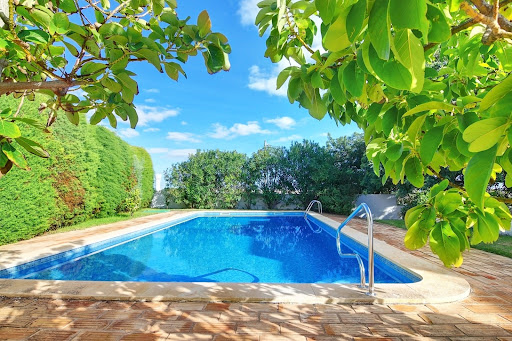How Do UV Rays Affect a Chlorine Pool?

When swimming on a sunny day, you can get sunburned by UV rays if you don’t take the right precautions. Also known as ultraviolet radiation, this type of electromagnetic radiation is created by the sun and sent to the Earth. While you can protect your skin by wearing sunscreen, UV rays will also negatively impact pool water. The chlorine in pools is greatly affected by ultraviolet radiation, which can lead to a variety of problems if you don’t take steps to combat it.
How do UV Rays Affect Chlorine?
Ultraviolet radiation from the sun’s rays affects chlorine by breaking it down at a chemical level. While in water, chlorine forms hypochlorite ions, which UV radiation will break apart. After the chlorine is released as a gas into the air, it can no longer protect your pool!
Additionally, hot weather plays a significant role in the disappearance of chlorine in pools. As the heat of the sun causes the chlorine to evaporate, a substantial amount of it can dissipate in only a few hours of exposure on a sunny day. Furthermore, as hotter weather promotes more bacterial growth, additional chlorine is used up to combat the formation. These combining factors cause chlorine levels to drastically decrease in summer weather.
Why do Pools Need Chlorine?
Although large amounts of chlorine are notorious for causing skin irritation, the chemical is vital for maintaining a clean pool. Here are a few of the many reasons why pools need chlorine:
Chlorine kills algae and prevents it from growing.
The presence of chlorine inhibits the cultivation of bacteria that can damage the health of swimmers.
Chlorine oxidizes pool contaminants, such as dirt, making swimming unpleasant.
When UV radiation and hot weather dissipate the chlorine in a pool, it can no longer perform these vital functions. Additionally, you will have to spend extra time adding more chlorine to your pool and spend more money on chlorine in the process.
What Steps Can I Take to Protect the Chlorine in My Pool?
Now that you understand the problems that ultraviolet radiation can inflict on a pool, you’re probably wondering how to maintain optimal chlorine levels. The easiest method is by covering the pool when it isn’t in use. Not only will this prevent the UV rays from breaking apart the chlorine, but it will also block any contaminants from entering it as well. Testing the chemical balance of your pool on a regular basis can ensure that the levels of chlorine are stable.
Another method of protecting the chlorine in a pool from ultraviolet radiation is by using other chemicals to combat the sun’s rays. A stabilizer known as cyanuric acid is a popular option, as it can help prevent the dissipation of chlorine in a similar way to how sunscreen protects your skin. However, be careful not to use too much of the stabilizer, as higher levels can lower the effectiveness of the chlorine and facilitate other problems, such as stains. Pool algaecide is another chemical, as it can assist in preventing algae growth if there is not enough chlorine present to do so.
Are you looking for other ways to enhance your pool? Reach out to ecoFINISH to learn about the polyFIBRO coatings and aquaBRIGHT aquatic coatings we offer!

